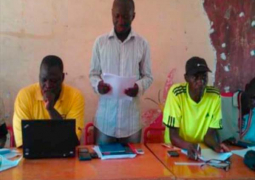I wrote an
article on 16 March 2020, which was published on the Freedom Newspaper (Thanks
Editor Mbaye) and can be found here. I wrote this article without knowledge of
the parliamentary session which took place the day before. In this session, the
Finance Minister said that the economic impact of COVID-19 will be D2.5B and
that the economy will shrink by 3% ‘age points to 3.3%. He also intimated that
the budget deficit is expected to widen from 1.5% of GDP to 2.1% whilst the net
domestic borrowing (NDB) will expand from 1.9% of GDP to 25%. I do not know if
the Standard Newspaper was meant to say 2.5% but this is questionable.
Let me
explain what some of these figures mean for the benefit of those who do not
understand how the dynamics of economics work. Budget deficit means that the
government spending more money than they earn. GDP means the total sum of the
value of goods and services the country produces and provides each year. Net
Domestic Borrowing is the difference between what the government borrows
locally through the issuing of treasury bills, Sukuk Al-Salaam, central bank
bills etc and what they pay back to investors on maturity of the bills.
For those who
do not know the dynamics of economics and how public finance works, you will
not see the gaps in the finance minister’s figures. I will hasten to add that
the Standard Newspaper also referred to the same parliamentary session where
the finance minister said that they have been having conference calls and had
pledges of D62Bfrom several international partners to combat coronavirus.
Coming back
to the figures, the finance minister in his 2020 budget speech at the National
Assembly in December 2019 said that as at end of September 2019, the Gambia’s
total debt stock was D71.3B split into domestic debt of D32.9B and external
debt of D38.4B. This has exponentially grown since then and continues to
increase. According to the IMF World Economic outlook published in October
2019, the Gambia’s GDP in 2020 will be US$1.925B, which is about D98B.
These figures
are telling us that the minister is planning to increase borrowing domestically
from about 2 billion Dalasis (1.9% of GDP) to 24 billion Dalasis (25% of GDP)
as a result of COVID-19. The widening of the budget deficit means three things:
Revenue contracting or increased spending or both.If the impact of COVID-19 is
D2.5B, why on earth is he planning to borrow D24B? What are the details of the
D62B pledges he received from “International partners” and who are these
international partners? What is the single most driver of the deficit widening?
These are questions the National Assembly should be asking the Finance
Minister. These figures also mean that as the government increases domestic
borrowing, commercial banks are more likely to invest in that scheme (because
it is safer) thereby depriving the population and businesses from accessing the
much-needed loans from commercial banks.
This
government should realise that now is not the time to be playing political ping
pong. Transparency and accountability must prevail to bring sanity into our
public finances. The minister is exploiting the COVID-19 situation to borrow
more money and the National Assembly is either paying a blind eye to it or do
not understand what the figures mean. This minister is redundant in ideas and
does not believe in anything other than borrowing, borrowing and borrowing!
What I expect
him to do is to work with the country’s creditors and re-negotiate the
country’s debts. This could be through reducing the interest rates to reduce
debt servicing cost. Do you know that this year alone, the Gambia is paying
D7.7B as debt services, which is 57% of the country’s domestic revenue? Having
that in mind, why would any sane person increase the debt burden on the
country?He could also arrange the deferment of the debt payments to creditors.
Although this is not ideal as future generations will shoulder the burden, it will
however ease the pressure on the meagre resources the country has in the short
term. There are plenty of ways to deal with this menace but having a minister
who is idea bankrupt means we resort to borrowing only. I expected the minister
to work with the Central Bank and reduce interest rates, encourage commercial
banks to support businesses through issuing more loans, giving people and
business loan repayment holidays, deferring infrastructural development
spending etc.
I recommend
that the minister steps down and tell the president that he is not fit to head
the finance ministry. I also recommend that National Assembly summon him
through telephone conference; to minimise physical contact and ask him
difficult questions around his figures. They need to ask him to provide more
detail on the D62B pledges, what he is going to do with the excess borrowing,
what his plans are to support hospitality businesses who will be most impacted,
what the government will do if people are to stay at home. How many people in
the Gambia can work from home if the situation warrants it? These are pertinent
questions that need urgent answers.
I did not
want to respond to the finance minister’s statements he made before the
national assembly due to the enormity of the impact of Coronavirus on people’s
lives and on world economies, but my conscience cannot let me keep quiet. It is
so sad to see that people are loosing their jobs and livelihoods because they
have been told to stay at home whilst those of us who can work from home or
anywhere there is an internet connection continue to earn our livelihoods. My
response is also necessitated by a letter template I saw on WhatsApp forums
yesterday purportedly from the Anti-Crime unit of the Gambia Police Force.
This letter
template says that bars, night clubs, brothels must close until further notice.
“Failure to comply with this order will result to forcefully closure and court
action”. I get it that we are in difficult times and I understand that we
should all endeavour to practice social distancing. However, we need to be
careful that this situation is being exploited by the government to institute
dictatorship. Imagine; Public gatherings – Banned! Loomos – Banned! Conferences
– Banned! Gaamos – Banned! I won’t be so much concerned if the government
advised people to refrain from these activities but out right banning it
without a state of emergency sounds dictatorial to me.
I am not a
constitutional or legal expert so I need help from brother Madi Jobarteh and
others to understand under which section of the constitution or the laws of the
Gambia have the Anti-Crime unit has the power to force people to close their
businesses without the president declaring a state of emergency? This is how
dictatorships develop and we must all tell the government that this is not the
way we want to be governed. We expect the government to work with us and
support us rather than applying the us and them philosophy. Can anyone see what
I am seeing or am I being dumb? Back off Anti-Crime!!! There is NO us and them,
we are all in this together so review your letter and start over again.
Nuha Ceesay
FCCA, MSc (Merit)
Leeds, United
Kingdom
Read Other Articles In Article (Archive)



